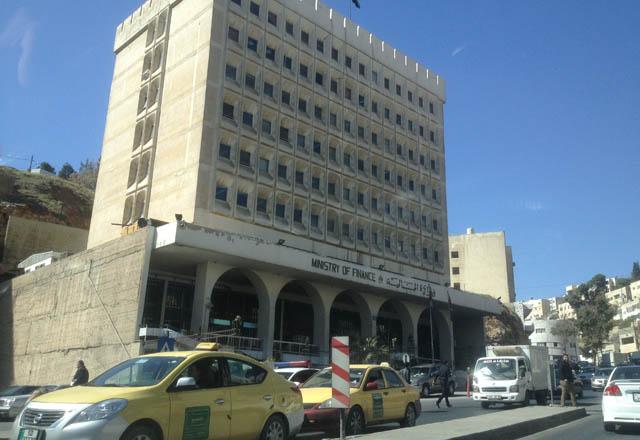You are here
Toukan points to IMF appraisal as validation of Jordan’s prudent economic performance
By Samir Ghawi - Apr 06,2014 - Last updated at Apr 06,2014
AMMAN — Finance Minister Umayya Toukan valued a positive appraisal by the International Monetary Fund (IMF) of Jordan’s economic performance describing it on Sunday as a validation for investors to set up or expand their businesses in the Kingdom.
He told a press conference that tackling a 12.6 per cent unemployment rate requires considerable investments, but for such large amounts to flow, the country should reassure investors with the right macroeconomic structure in terms of legislation, taxation, law enforcement, stability and security, sound financial management, and prudent planning.
According to the minister, the IMF assessment this week was a substantiation of Jordan’s reforms, progress and development.
Toukan expressed confidence that sizeable investments will be made this year especially in the water, transport and energy sectors and spoke of extremely low prices of shares listed on the Amman Stock Exchange as profitable opportunities.
However, Toukan stressed the importance of employment as a major challenge facing the country.
He said Jordan’s capabilities are limited and, regardless of growth rates, there is no escape from the fact that Jordanians should seek jobs abroad.
“Even if it rains money, the Kingdom cannot absorb all those who graduate from universities,” the minister remarked.
The IMF said in a statement late Friday that growth increased to about 3 per cent in 2013, noting strengthening activity in financial services, telecommunications, trade and construction.
It predicted growth to gradually rise to 3.5 per cent in 2014 and to 4.5 per cent in the medium term.
The statement expected the inflation rate to continue dropping from just over three per cent in 2013, to about 2.5 per cent at the end of this year and 2 per cent in the medium term.
Reflecting a lower energy import bill, the IMF projected a gradual improvement in the current account deficit (including grants) to approximately 4.5 per cent of the gross domestic product (GDP) over the medium term, noting that risks to this outlook remain high, mostly due to the Syrian conflict and the further disruptions in energy imports.
It estimated that in 2013, the current account deficit has improved by over 5 per cent of GDP, to less than 10 per cent of GDP, helped by lower energy imports, higher transfers and private receipts.
Toukan told journalists that Jordanians are beginning to rationalise energy consumption giving as an example a hotel owner in Aqaba who turns on the lights of the inn only on Thursday, Friday and Saturday.
Finance Secretary General Omar Al Zu’bi said the energy import bill should be on a downward course indicating that the government will pay the National Electric Power Company (NEPCO) JD1.5 billion this year.
Zu’bi added that the amount should cover the losses of NEPCO, its debts, and the arrears it owe to the Jordan Petroleum Refinery Company.
“The adoption of revenue measures and increase in electricity tariffs is expected to ensure that the 2014 budget and NEPCO’s losses are consistent with the authorities’ objectives of reducing the combined primary deficit to 8.3 per cent of GDP, from 9.3 per cent in 2013,” the IMF statement said.
It added: “Beyond 2014, the medium-term energy and water strategies will gradually return the utilities to cost recovery.”
The IMF commended Jordan’s financial sector reform by underlying its gradual progress, describing the banking sector as “stable and overall sound”, and indicating that the monetary policy will continue to focus on maintaining appropriate international reserve buffers.
“The Central Bank of Jordan is working on making the sector more resilient, including by improving the collection of supervisory data and enhancing the regulatory framework,” it said.
Toukan acknowledged the importance of interest rates as an important factor in investment decisions and emphasised that special consideration should be given to small- and medium-sized enterprises as engine of growth and not only mega-corporations.
In the press conference dialogue, Eyad Qudah, director general of the Income and Sales Tax Department, pointed out that revenue from the sales tax surged by JD150 million during the first three months of this year compared to the amount collected during the same period of last year.
Qudah indicated that a financial committee is following up intensively on salvaging around JD2 billion of sales tax overdues that have accumulated over several years.
Describing the task as arduous and lengthy, the director general said that tangible progress is slowly being achieved although he expected that only JD0.5 billion will be retrieved.
He spoke about the fuel subsidy cash payments, indicating that a more than 900,000 persons have submitted applications but only around 700,000 were found to be eligible beneficiaries.
Munzer Al Assaf, director general of the Customs Department, revealed that revenue was higher by JD58 million during the first three months of this year compared to the same period of 2013.
Mohammed Al Hazaymeh, director of the budge department, told the journalists that, for the first time, the Ministry of Finance is issuing quarterly payment orders to various ministries and government departments within a strategy of control and financial discipline
Hazaymeh also mentioned administrative changes whereby a number of posts, such as advisers, were cancelled at several government institutions.
The minister concluded by assuring journalists that all is progressing as planned with regard to Jordan’s $1 billion Eurobond float guaranteed by the United States and expected the launch before the end of June 2014.
Related Articles
Finance Minister Umayya Toukan on Wednesday pointed to more than JD4 billion of cumulative deficit borne by the National Electric Power Company (NEPCO) until July as the reason that puts Jordan's net public debt to the gross domestic product (GDP) at 79.5 per cent.
The government has issued a $1 billion worth of US-guaranteed eurobonds in New York on Tuesday, according to Finance Minister Umayya Toukan.
Finance Minister Umayya Toukan on Sunday said positive economic indicators show that Jordan’s economy is on the right track of recovery.
















